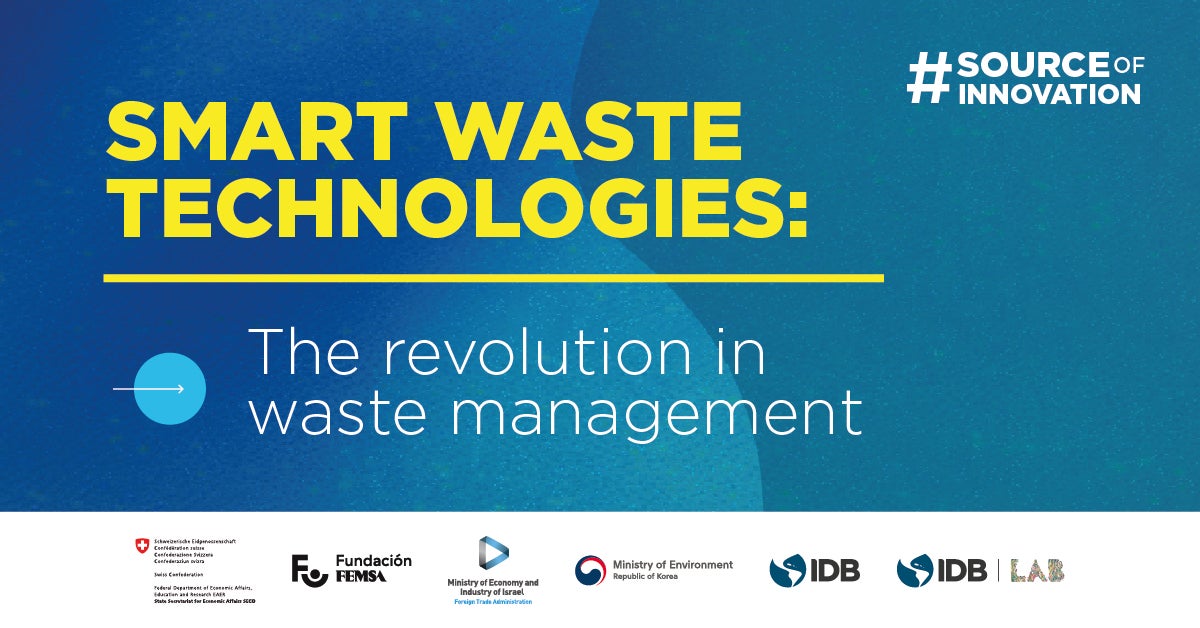By Paula Guerra*
On March 2nd, 2023, the first webinar on Smart Waste Technologies (SWT) was held in Latin America and the Caribbean. This event, led by the IDB’s Source of Innovation alliance, promoted the use of digital technologies to improve efficiency in municipal solid waste management.
Did you know that over 100 technologies, identified by the European Bank for Reconstruction and Development (EBRD), increase efficiency in the solid waste management chain -generation, separation, collection, transfer, recovery and final disposal- and promote the transition towards the sector’s digitization? In this virtual conference, the audience learned about trend-setting tools used by waste management service providers worldwide.
Implementation of Smart Waste Technologies
Cloud computing
David Biderman, CEO of the Solid Waste Association of North America (SWANA) presented on Smart Waste Technologies, such as telematics systems that increase operational efficiency of waste collection services by:
- Providing smart routing design.
- Improving operator productivity (by approximately 12%).
- Reducing costs through efficiency in fuel consumption and preventive maintenance.
Internet of Things (IoT)
RFDI (Radio Frequency Identification) chips offer access to real-time information on the volume and quantity of collected waste, contributing to the efficiency of waste collection services.
Artificial Intelligence (AI)
AI technologies, such as scanners and robots, improve efficiency in waste separation and recovery. They provide geospatial information through drones and data analysis to monitor operations at final disposal sites (landfills and open dumps) and identify new sites for future facilities.
Currently, the creation and implementation of digital technologies that gather and analyze data is gaining service providers’ interest, as they contribute to key performance indicators, goal compliance and public policy design.
The IDB developed:
- the GIRSU-Rating: a self-management tool for continuous improvement of the performance of solid waste management service providers; and
- the Waste and Circular Economy Hub: a pioneering information system at the regional level that will be launched on May 17th, 2023. The Hub will present waste management data for individual countries to identify regional gaps and opportunities, as well as foster peer-to-peer dialogue and information sharing.
Industry 4.0 in solid waste management is a reality, Smart Waste Technologies are present and ready to revolutionize the way we see and manage our waste.
In the Municipality of Renca (Chile), GPS tools and remote surveillance cameras in waste collection trucks improved the efficiency of waste collection route control activities, strengthened operator transparency, and generated communication channels with end users.
In the Dominican Republic and in Haiti, drones and the analysis of geospatial information facilitated the technical closure of landfills and the identification of a possible location for a new waste management facility. Digital technologies improved the flood management efficiency and timely decision making in waste management. They also generated data that did not exist in Haiti, such as information on population, state of road infrastructure and topographic surveys for the new disposal site.
To learn more about what was discussed in the webinar, watch the recordings of the event.
About Source of Innovation
Source of Innovation is an alliance of the IDB Group with external partners to promote the development and adoption of innovative solutions in the water, sanitation and solid waste sector to achieve smart, inclusive and sustainable services, with a focus on service providers in Latin America and the Caribbean.
Source of Innovation is funded by the Government of Switzerland through its State Secretariat for Economic Affairs (SECO), by the FEMSA Foundation, by the Republic of Korea through its Ministry of Environment, and by the Government of Israel. The partnership is also complemented by direct contributions from IDB Lab and the IDB’s Water and Sanitation Division.
Guest author
*Paula Guerra. Solid waste and inclusive recycling consultant for the IDB and previously has conducted work as a consultant for different entities in Latin America. She worked in the Ministry of the Environment of Ecuador as manager of the National Solid Waste Management Program, and in the Municipality of Quito as Logistics and Recycling Coordinator in the city’s Cleaning Company. Guerra has a Masters in Sustainable Development from the University of London and further studies in Solid Waste Management with UNESCO IHE.


Leave a Reply